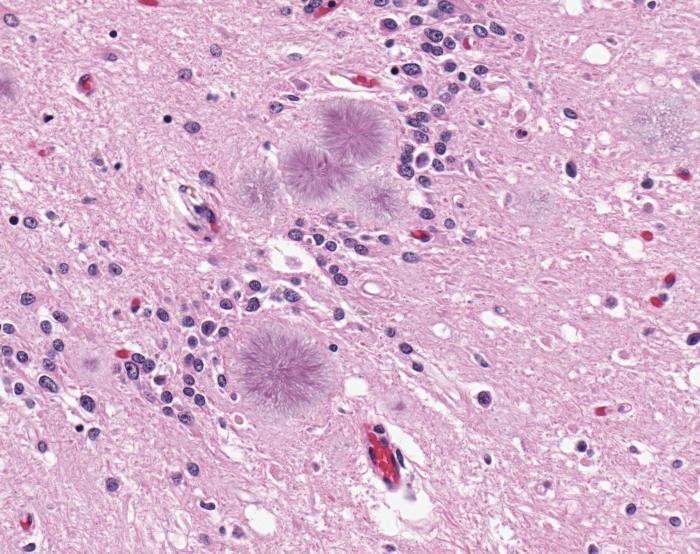Fatal Brain Disease in US Man Likely Came from UK Beef

A U.S. man who developed a rare and fatal brain disease likely got the disease from eating beef while living abroad more than a decade earlier, according to a new report of the case.
The man, who was in his 40s when he first got sick, died in Texas in May 2014. Because the condition, known as variant Creutzfeldt-Jakob disease, is so rare, the man was misdiagnosed and even hospitalized for psychiatric symptoms multiple times before doctors suspected the true cause of his symptoms, according to the report from researchers at the Centers for Disease Control and Prevention and Baylor College of Medicine.
Variant Creutzfeldt-Jakob disease is thought to arise from eating beef contaminated with infectious prions, which are proteins that fold abnormally and form lesions in the brain. In the United Kingdom, there have been nearly 200 cases of variant Creutzfeldt-Jakob disease tied to eating contaminated beef in the 1980s and 1990s. (In cattle, the condition is sometimes known as "mad cow disease.")
In the United States, there have been three earlier cases of variant Creutzfeldt-Jakob disease, but in all of these cases, the patients had previously lived in either the United Kingdom or Saudi Arabia.
In the new case, the man had never lived in the United Kingdom, or in any country where people have been suspected of acquiring variant Creutzfeldt-Jakob disease (vCJD) from eating beef. However, the man had lived in Kuwait, Russia and Lebanon, and the researchers suspect he likely got the disease while living in one of these countries, all of which had imported beef from the United Kingdom.
The man's case shows "the persistent risk for vCJD acquired in unsuspected geographic locations and highlights the need for continued global surveillance and awareness to prevent further dissemination of vCJD," the researchers said. [10 Things You Didn't Know About the Brain]
The man was born in the Middle East and moved to the United States in the 1990s. He became a naturalized U.S. citizen, and was healthy until late 2012, when he started to become depressed and anxious. He later developed hallucinations and changes in behavior, including becoming more withdrawn and secretive.
Sign up for the Live Science daily newsletter now
Get the world’s most fascinating discoveries delivered straight to your inbox.
A little over a year after his initial symptoms, the man was hospitalized several times for his psychiatric problems. Doctors thought the man might have a type of depression that comes with symptoms of psychosis, or bipolar disorder with psychosis, but treatments for these disorders failed to improve his condition.
Around this time, the man also experienced jerky, involuntary movements and trouble with his reflexes. Doctors ran a number of tests to rule out autoimmune diseases, heavy metal poisoning, vitamin deficiency and hormone disorders.
Doctors then suspected the man had vCJD, and so samples of blood, urine and spinal fluid were sent for testing. The blood test (which can miss cases) came back negative, but the urine test — which was only recently developed, and is still considered experimental — came back positive.
A brain biopsy could have confirmed the diagnosis, but by this time, doctors were concerned that the procedure would worsen the man's health. The man's condition declined further, and he died shortly after that point, which was 18 months after he initially showed symptoms.
A brain autopsy confirmed the man had vCJD.
"The potential difficulty in making the clinical diagnosis in many patients with vCJD and the delay with which the disease is first suspected raises the concern that vCJD can be missed," the researchers write in the May issue of the journal Emerging Infectious Diseases.
Although it's not clear where the man became infected, the researchers said his risk of exposure to prions was highest when he was living in Kuwait because of the amount of beef exported to that country from the United Kingdom.
"This case underscores that the diagnosis of vCJD should not be dismissed if the patient has not resided in a country with a known endemic case of vCJD," the researchers said. "Given the several decades' long potential incubation periods estimated from epidemiologic modeling, the international occurrence of additional vCJD cases can be reasonably anticipated."
Follow Rachael Rettner @RachaelRettner. Follow Live Science @livescience, Facebook & Google+. Original article on Live Science.

Rachael is a Live Science contributor, and was a former channel editor and senior writer for Live Science between 2010 and 2022. She has a master's degree in journalism from New York University's Science, Health and Environmental Reporting Program. She also holds a B.S. in molecular biology and an M.S. in biology from the University of California, San Diego. Her work has appeared in Scienceline, The Washington Post and Scientific American.









